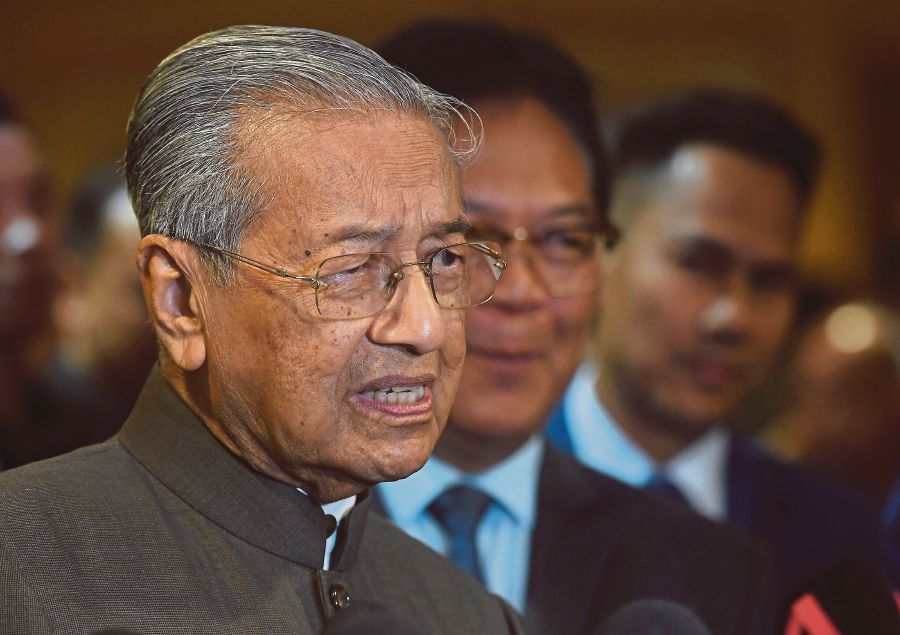
PUTRAJAYA: The government will review the country’s laws against the distribution and abuse of drugs, Prime Minister Tun Dr Mahathir Mohamad said.
He said at present, the mandatory death penalty was seen by some as too harsh and ineffective as a deterrent.
“Currently, the punishment for possessing a certain amount of drugs is the mandatory death sentence and the judge has no right to drop a punishment other than that one.
“Some people feel that it is too harsh, so perhaps we would amend the law so those found guilty will be sentenced to life imprisonment instead,” he said after launching the National Anti-Drug Month here today.
He said there were also certain quarters who felt that the mandatory death penalty was ineffective as there were still many who were making money illegally through drug trafficking.
“We will study if the claims (that mandatory death penalty is ineffective) are true, and if there are other ways to prevent the usage and trafficking of drugs, then we will amend the laws.
“It is also important for us to understand that the abuse of drugs is harmful not just to ourselves, but also to our family, the community and the country,” he said.
Earlier in his speech, Dr Mahathir said drugs were still the nation’s "top enemy", adding that the trend of drug abuse had changed from the conventional plant-based drugs such as cannabis (ganja), morphine and heroin, to synthetic drugs that were more harmful.
“In 2018, there were 130,788 drug addicts in Malaysia. Based on an estimated national population of 32.4 million, that is 404 drug and substance abusers and addicts for every 100,000 people.
“Between January and June 2019, a total of 105,375 drug and substance abusers and addicts were recorded, an increase of 23.2 per cent compared to the same period in 2018.”
Also worrying, he said, was the increase in demand for synthetic drugs such as methamphetamine and the emergence of new psychoactive substances (NPS) in the Asian market, with many new psychoactive substances worldwide.
Dr Mahathir also noted that in 2009, only 130 types of NPS were reported. However, from 2009 to 2019, the number jumped to 892 types reported in 119 countries.
“Drugs are an easy and lucrative source of income, which becomes a continued attraction to criminals.
“In 2019, drugs worth RM3.53 billion were seized, compared to RM0.58 billion in 2018.
“These numbers show that drug traffickers would do anything to benefit from the misery of others.”
He urged the authorities to take into account the changes in trends to ensure efficient enforcement and drug rehabilitation treatments.
Dr Mahathir also called upon the private sector, non-governmental organisations and communities to support efforts to curb drug-related problems and other social issues.
“The theme of the 37th National Anti-Drug month, 'Prosperity and Mutual Well-Being' (Kemakmuran dan Kesejahteraan Bersama) emphasises the role of communities.
“I urge the private sector to have activities related to preventing drug and substance abuse as part of their corporate social responsibility programmes,” he said.
Dr Mahathir later presented the Anti-Drug Icon award to his wife, Tun Dr Siti Hasmah Mohd Ali.
Also present were Home Minister Tan Sri Muhyiddin Yassin and his deputy, Datuk Azis Jamman.
Meanwhile, Muhyiddin said the issue of drug abuse must become the top agenda for all parties as it could bring adverse implication to the safety, prosperity and welfare of the country.
He said his ministry had introduced several strategies that were more effective and aggressive in its awareness programmes through NADA.
The agency, he said, had implemented 764 programmes with the engagement of 52 government agencies and 173 NGOs.
“The implementation of the pilot project in 2019 had shown positive impacts, such as the reduction of theft cases by 32.7 per cent, the reduction of students skipping school by 18 per cent, and the decrease in drug distribution ‘ports’ by 12.9 per cent,” added Muhyiddin.
